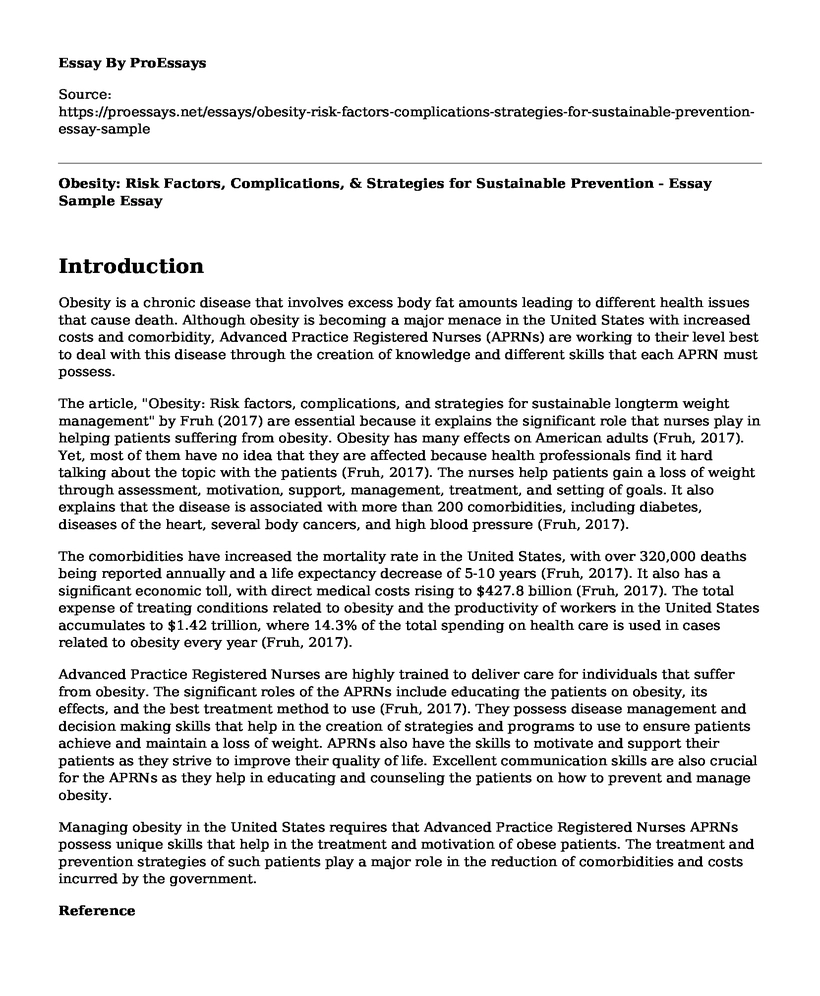Introduction
Obesity is a chronic disease that involves excess body fat amounts leading to different health issues that cause death. Although obesity is becoming a major menace in the United States with increased costs and comorbidity, Advanced Practice Registered Nurses (APRNs) are working to their level best to deal with this disease through the creation of knowledge and different skills that each APRN must possess.
The article, "Obesity: Risk factors, complications, and strategies for sustainable longterm weight management" by Fruh (2017) are essential because it explains the significant role that nurses play in helping patients suffering from obesity. Obesity has many effects on American adults (Fruh, 2017). Yet, most of them have no idea that they are affected because health professionals find it hard talking about the topic with the patients (Fruh, 2017). The nurses help patients gain a loss of weight through assessment, motivation, support, management, treatment, and setting of goals. It also explains that the disease is associated with more than 200 comorbidities, including diabetes, diseases of the heart, several body cancers, and high blood pressure (Fruh, 2017).
The comorbidities have increased the mortality rate in the United States, with over 320,000 deaths being reported annually and a life expectancy decrease of 5-10 years (Fruh, 2017). It also has a significant economic toll, with direct medical costs rising to $427.8 billion (Fruh, 2017). The total expense of treating conditions related to obesity and the productivity of workers in the United States accumulates to $1.42 trillion, where 14.3% of the total spending on health care is used in cases related to obesity every year (Fruh, 2017).
Advanced Practice Registered Nurses are highly trained to deliver care for individuals that suffer from obesity. The significant roles of the APRNs include educating the patients on obesity, its effects, and the best treatment method to use (Fruh, 2017). They possess disease management and decision making skills that help in the creation of strategies and programs to use to ensure patients achieve and maintain a loss of weight. APRNs also have the skills to motivate and support their patients as they strive to improve their quality of life. Excellent communication skills are also crucial for the APRNs as they help in educating and counseling the patients on how to prevent and manage obesity.
Managing obesity in the United States requires that Advanced Practice Registered Nurses APRNs possess unique skills that help in the treatment and motivation of obese patients. The treatment and prevention strategies of such patients play a major role in the reduction of comorbidities and costs incurred by the government.
Reference
Fruh, S. M. (2017). Obesity: Risk factors, complications, and strategies for sustainable longterm weight management. Journal of the American Association of Nurse Practitioners, 29(S1), S3-S14. Retrieved from https://www.ncbi.nlm.nih.gov/pmc/articles/PMC6088226/pdf/JAAN-29-S3.pdf
Cite this page
Obesity: Risk Factors, Complications, & Strategies for Sustainable Prevention - Essay Sample. (2023, Mar 29). Retrieved from https://proessays.net/essays/obesity-risk-factors-complications-strategies-for-sustainable-prevention-essay-sample
If you are the original author of this essay and no longer wish to have it published on the ProEssays website, please click below to request its removal:
- The Problem of Nursing Shortage Paper Example
- Practicing Through Self-Regulation Program Paper Example
- Research Paper on Diagnosis and Treatment of Multiple Myeloma
- Zika Virus: Mosquito-Borne Threat to People - Essay Sample
- Essay Sample on Population Health: Factors Determining Health Outcomes & Strategies for Improvement
- Nursing School: Challenges & Rewards of an Educationally Arduous Experience - Essay Sample
- Free Paper Example: Perioperative Service Enhancement







